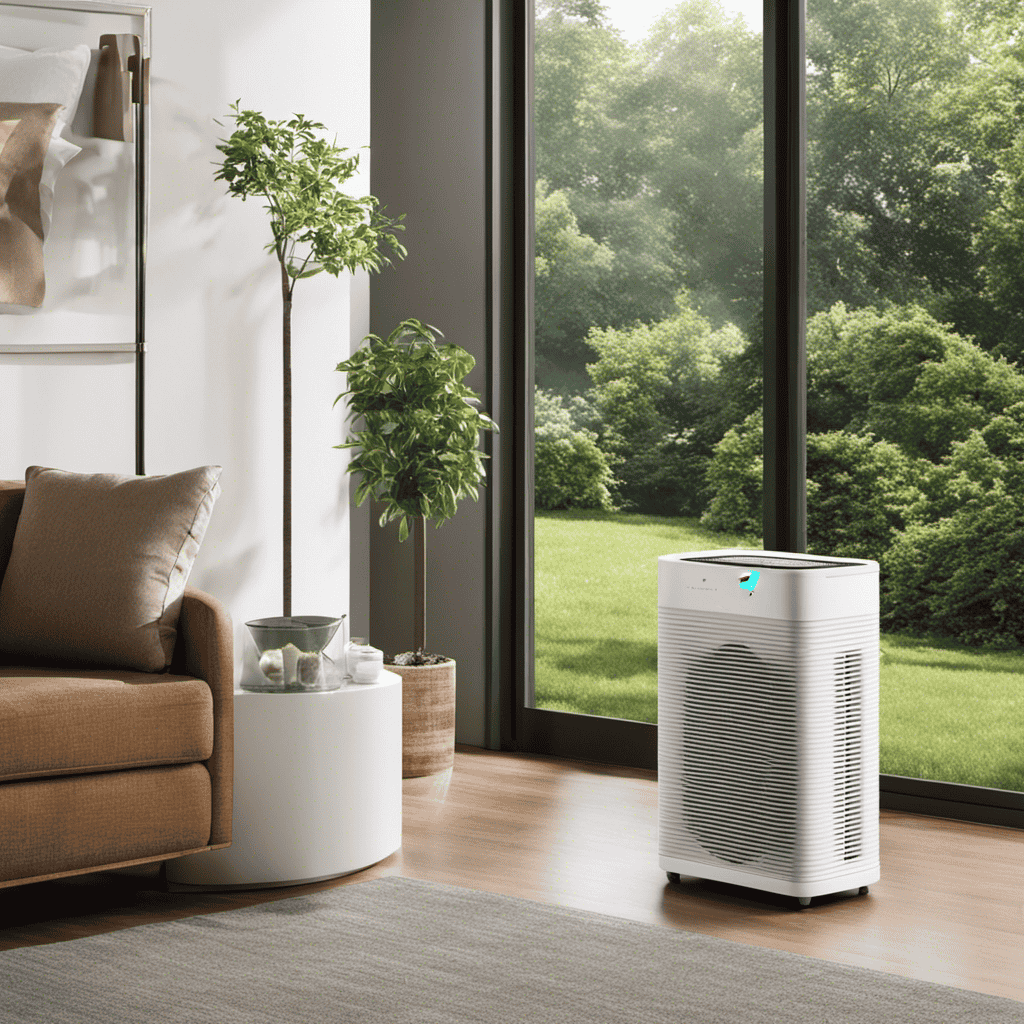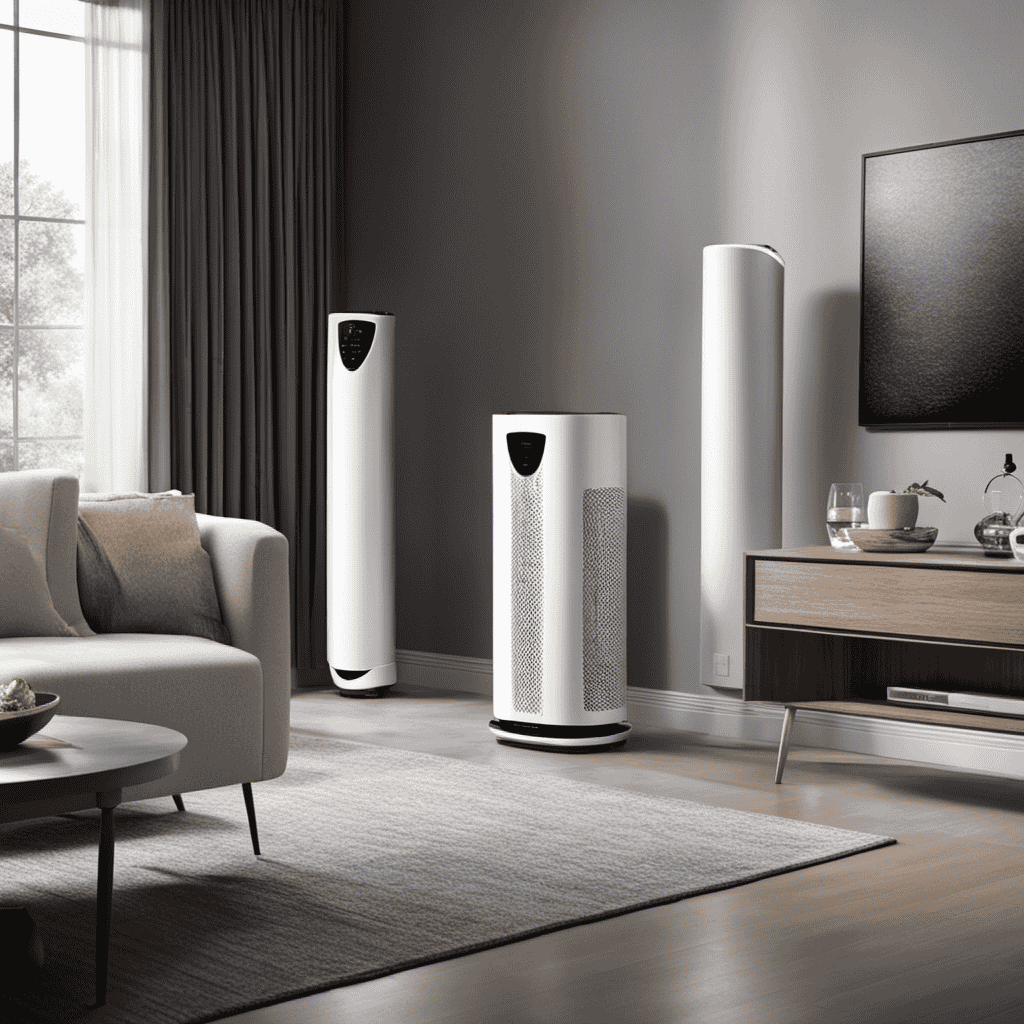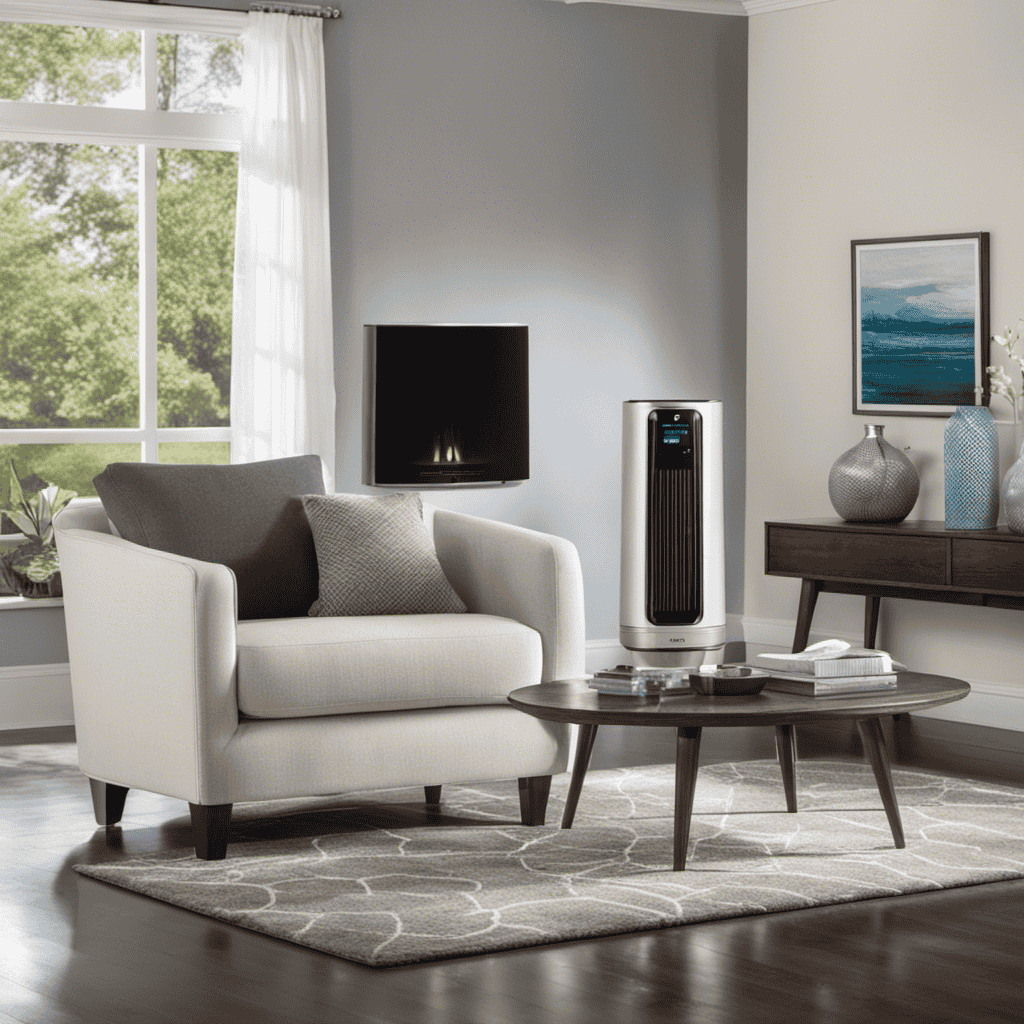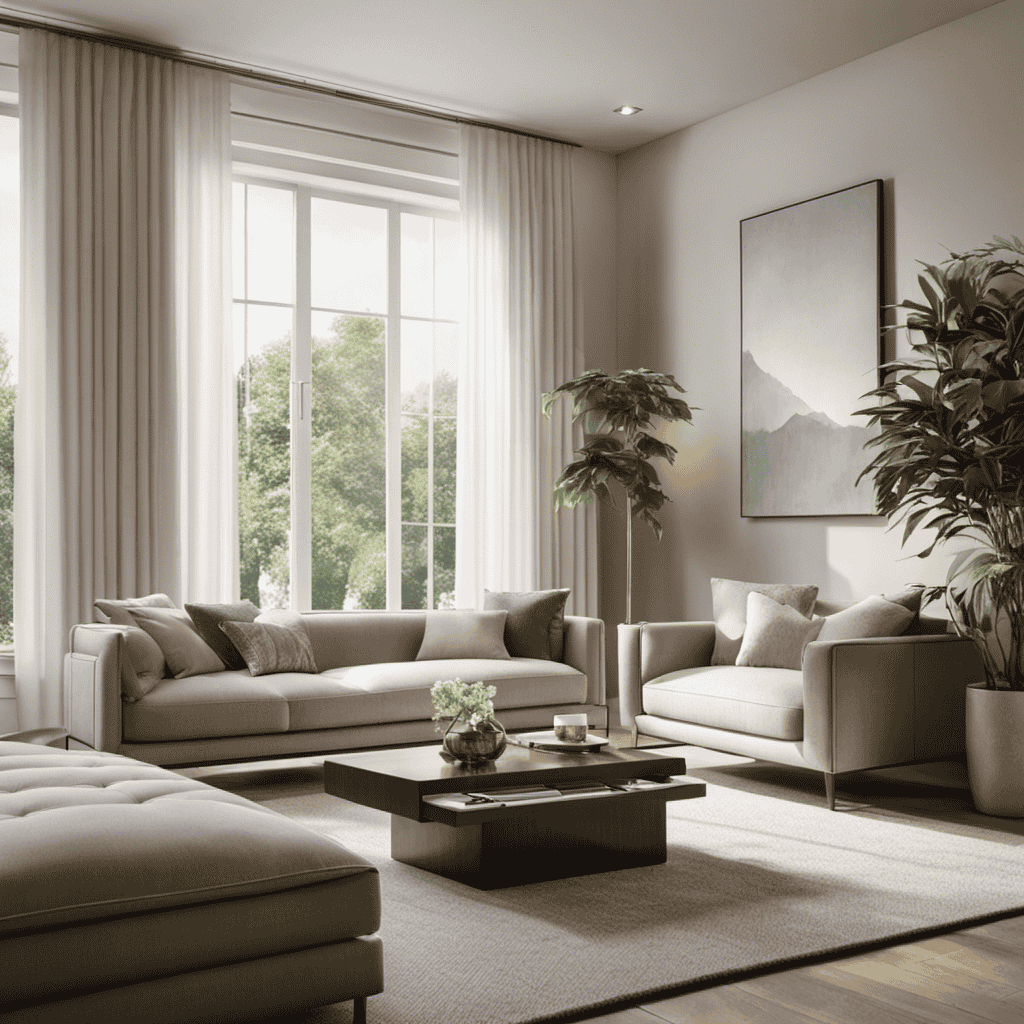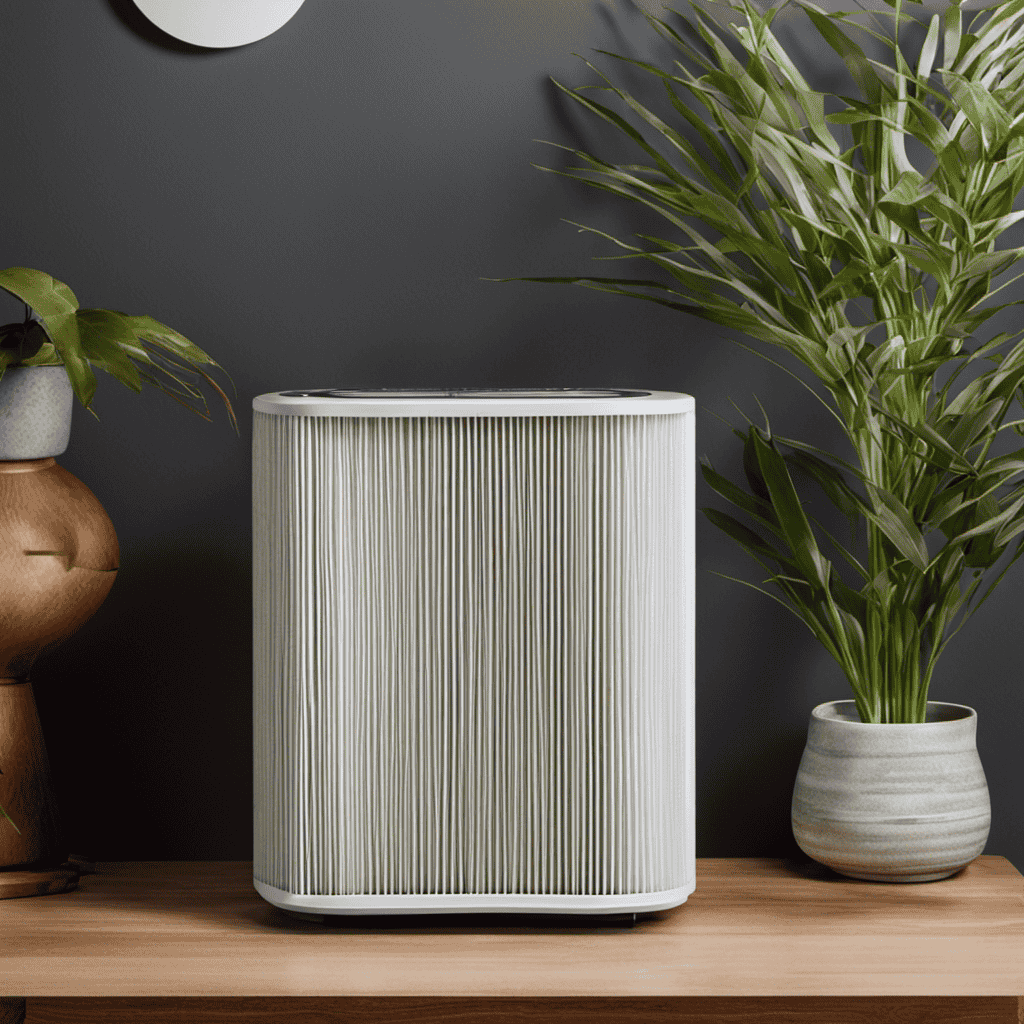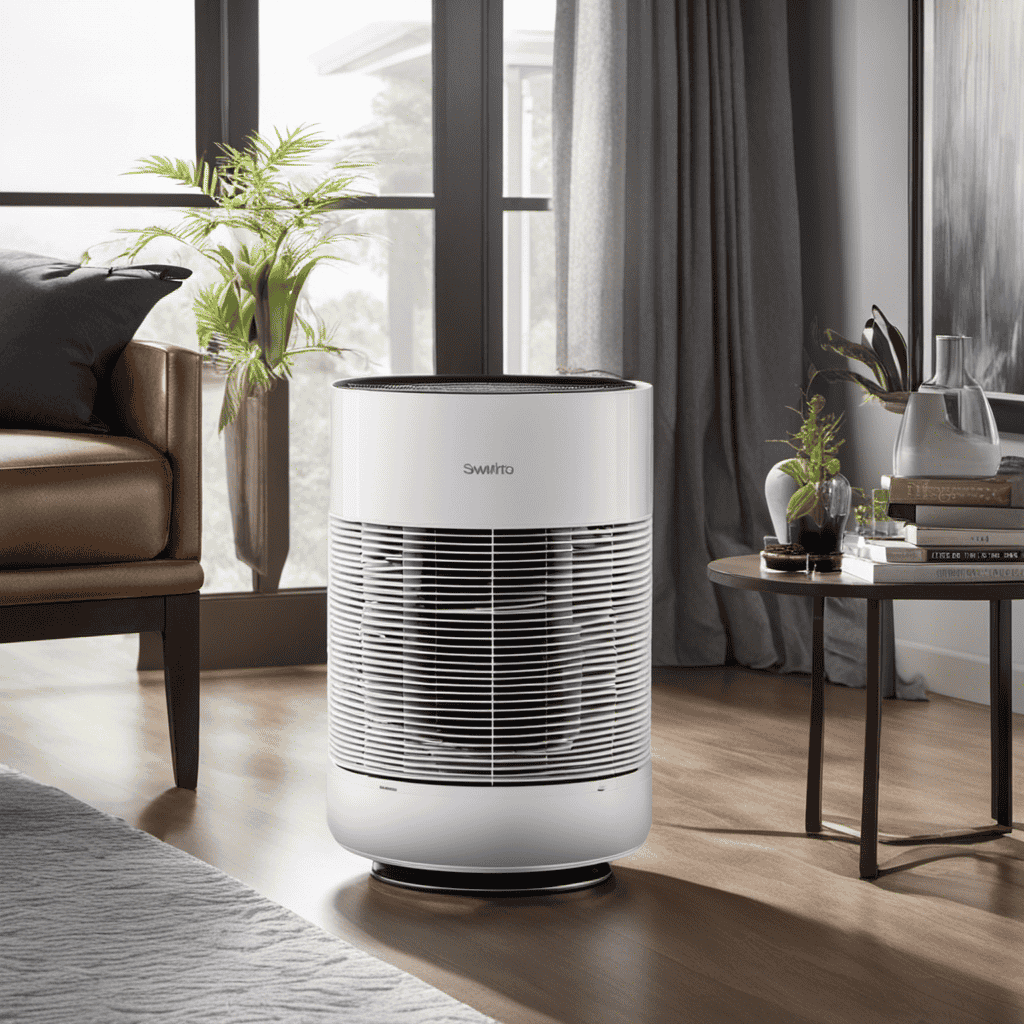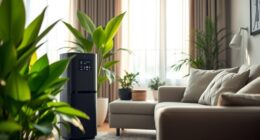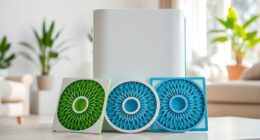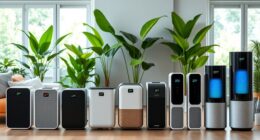In my quest to enhance the air quality within my living space, I’ve turned to using an air purifier. However, the dilemma of what exactly to use within it was a query that plagued me, prompting a research-intensive exploration to identify the best possible alternatives.
In this article, I’ll share my findings on the different types of filters, key features to consider, common allergens to target, and even natural remedies. Join me as we explore the world of air purifier fillers and unlock the secrets to cleaner, fresher air.
Key Takeaways
- There are different types of filters for air purifiers, including HEPA filters, activated carbon filters, UV filters, and ionizers.
- Understanding the benefits and limitations of each filter type is essential in choosing the right one for specific needs and preferences.
- Regular maintenance is important to ensure optimal performance of the air purifier.
- Additional additives such as activated carbon, antimicrobial agents, and essential oils can enhance the air purifying capabilities and provide a pleasant scent.
Types of Air Purifier Filters
There are three main types of air purifier filters: HEPA, activated carbon, and ionizers. Each type has its own key features and benefits.
HEPA filters are highly effective at removing airborne particles, such as dust, pollen, and pet dander. They work by using a fine mesh to trap these particles and prevent them from circulating in the air.
Activated carbon filters specialize in removing odors, chemicals, and volatile organic compounds (VOCs). They have a porous structure that absorbs these substances, leaving the air smelling fresh and clean.
Ionizers, on the other hand, release negatively charged ions into the air, which attract and neutralize airborne pollutants.
Some air purifiers also have the option to use essential oils, allowing you to enjoy aromatherapy while improving indoor air quality.
Key Features to Consider for Air Purifier Inserts
When it comes to choosing an air purifier, understanding the different filter types and cleaning technologies available is essential.
The type of filter you select will determine the pollutants and particles it can effectively remove from the air.
Additionally, knowing about the various cleaning technologies used in air purifiers will help you make an informed decision about which one is best suited for your needs.
Filter Types for Purifiers
Different filter types are used in air purifiers to effectively remove particles and pollutants from the air. When it comes to maintaining the cleanliness of the air we breathe, it is important to understand the different options available.
Here are some key filter types to consider:
-
HEPA Filters: These high-efficiency particulate air filters are designed to trap 99.97% of particles as small as 0.3 microns, including dust, pet dander, pollen, and mold spores. They are highly effective in improving indoor air quality and are recommended for those with allergies or asthma.
-
Activated Carbon Filters: These filters are excellent at removing odors, gases, and chemicals from the air. They work by adsorbing the pollutants onto a porous surface, effectively neutralizing them.
-
UV Filters: Ultraviolet (UV) filters use UV-C light to kill bacteria, viruses, and other microorganisms in the air. They are often used in combination with other filters for maximum purification.
-
Ionizers: Ionizers release negative ions into the air, which attach to positively charged particles like dust and smoke, causing them to fall to the ground or attach to surfaces. While they can be effective at reducing airborne particles, they can also produce ozone, which can be harmful in high concentrations.
Understanding the benefits and limitations of each filter type is essential in maintaining a clean and healthy indoor environment. Regular maintenance, such as replacing filters as recommended by the manufacturer, will ensure optimal performance and longevity of your air purifier.
Effective Cleaning Technologies
To effectively clean the air in your home, consider using air purifiers with filters that trap particles, remove odors, or kill microorganisms.
There are various types of air purifier technologies available in the market today that offer different benefits. One such technology is the High-Efficiency Particulate Air (HEPA) filter, which can capture up to 99.97% of airborne particles as small as 0.3 microns. This is especially useful for people with allergies or asthma.
Another technology is the activated carbon filter, which effectively removes odors and volatile organic compounds (VOCs) from the air.
UV-C light technology is also commonly used in air purifiers to kill microorganisms like bacteria and viruses.
Common Allergens to Target With Air Purifier Additives
You can use air purifier additives to target common allergens and improve indoor air quality. Here are some types of air purifier additives that can help you combat allergens:
- Activated carbon: It can effectively remove odors, chemicals, and volatile organic compounds (VOCs) from the air.
- HEPA filters: These filters capture microscopic allergens such as pollen, dust mites, pet dander, and mold spores.
- Antimicrobial agents: They help inhibit the growth of bacteria, viruses, and mold, reducing the risk of respiratory infections.
- Essential oils: Certain oils, like eucalyptus or tea tree oil, have antimicrobial properties and can also provide a pleasant scent.
Using air purifier additives offers several benefits. They can reduce allergy symptoms, improve respiratory health, and create a cleaner and more pleasant indoor environment.
Additionally, air purifier additives can help eliminate unpleasant odors and create a fresher atmosphere. By targeting common allergens, you can enjoy cleaner air and a healthier living space.
Essential Oils and Aromatherapy Options for Air Purifiers
Certain essential oils, like lavender or peppermint oil, can be used as aromatherapy options in your air purifier to create a soothing and refreshing atmosphere. Aromatherapy is the practice of using essential oils to improve physical and mental well-being. When used in an air purifier, essential oils have the potential to enhance the benefits of air purification by adding a pleasant fragrance to the purified air.
The benefits of aromatherapy are vast and well-documented. Essential oils have been found to have a positive impact on mood, stress levels, and sleep quality. For example, lavender oil is known for its calming properties and can promote relaxation and improve sleep. Peppermint oil, on the other hand, is invigorating and can help increase focus and mental clarity.
To further emphasize the benefits of aromatherapy, here is a table showcasing some popular essential oils and their associated benefits:
| Essential Oil | Benefits |
|---|---|
| Lavender | Calming, relaxation, improved sleep |
| Peppermint | Invigorating, increased focus, mental clarity |
| Eucalyptus | Respiratory support, congestion relief |
| Lemon | Energizing, mood enhancement, immune support |
Incorporating essential oils in your air purifier not only improves the air quality but also enhances your overall well-being through the power of aromatherapy.
Benefits of Activated Charcoal in Air Purifier Systems
When it comes to air purification, activated charcoal has been proven to be highly effective in removing harmful pollutants and enhancing indoor air quality.
The unique properties of charcoal allow it to trap and absorb a wide range of toxins, chemicals, and allergens, making it an excellent choice for air purifier systems.
Research has shown that activated charcoal can effectively remove pollutants such as formaldehyde, volatile organic compounds (VOCs), and odors, making it a valuable tool in creating a healthier and cleaner indoor environment.
Charcoal’s Air Purification Properties
If you want to improve the air quality in your home, try using charcoal in your air purifier. Charcoal, specifically activated carbon, has been proven to be highly effective in removing pollutants from the air.
Here are some reasons why charcoal is a great choice for your air purifier:
- Activated carbon has a large surface area, allowing it to trap a wide range of contaminants such as allergens, odors, and chemicals.
- Charcoal can effectively remove volatile organic compounds (VOCs) that contribute to indoor air pollution.
- It can help reduce the presence of harmful gases like formaldehyde and benzene.
- Charcoal is a natural and eco-friendly option for air purification, as it doesn’t release any harmful byproducts into the air.
Removing Harmful Pollutants Effectively
Activated carbon, with its large surface area, effectively traps a wide range of pollutants like allergens, odors, and chemicals. When it comes to removing harmful pollutants from the air, there are several cleaning techniques available.
One popular method is using air purifiers equipped with activated carbon filters. These filters are designed to adsorb pollutants onto their surface, effectively removing them from the air. The activated carbon works by attracting and trapping the pollutants, preventing them from circulating in your indoor environment.
This makes activated carbon an essential component in air purifiers, as it enhances their ability to tackle air pollution. Whether it’s dust, pet dander, or volatile organic compounds (VOCs), activated carbon filters can efficiently capture these pollutants, providing you with cleaner and fresher air to breathe.
Enhancing Indoor Air Quality
To enhance your indoor air quality, consider incorporating activated carbon filters into your cleaning routine. These filters are highly effective at reducing indoor pollutants and can provide numerous benefits for your health and well-being.
Here are some key reasons why you should consider using activated carbon filters in your air purifier:
-
Removes harmful chemicals: Activated carbon filters have a porous structure that can trap and absorb various volatile organic compounds (VOCs) and other harmful chemicals present in the air.
-
Eliminates odors: The activated carbon in these filters can effectively neutralize unpleasant odors caused by cooking, pets, smoke, or mold.
-
Reduces allergens: These filters can help capture allergens like pollen, dust mites, and pet dander, providing relief for individuals with allergies or asthma.
-
Improves overall air quality: By removing pollutants and odors, activated carbon filters can significantly improve the overall air quality in your home, making it safer and more comfortable to breathe.
Incorporating activated carbon filters into your air purifier can be a simple yet effective way to create a healthier living environment by reducing indoor pollutants.
The Role of UV-C Light in Air Purification
UV-C light plays a key role in air purification by neutralizing harmful pathogens. Its applications in air disinfection are backed by scientific research.
UV-C light works by damaging the DNA and RNA of microorganisms, preventing their reproduction and rendering them harmless. When UV-C light is emitted at a specific wavelength of around 254 nanometers, it has the ability to deactivate viruses, bacteria, mold, and other pathogens in the air. This process is known as ultraviolet germicidal irradiation (UVGI).
The science behind UV-C air disinfection is based on the principle that microorganisms are vulnerable to UV-C light because their genetic material absorbs it more readily than human cells. This makes UV-C light an effective tool in improving indoor air quality and reducing the spread of airborne diseases.
Antimicrobial Agents for Improved Air Quality
When it comes to improving air quality, antimicrobial agents play a crucial role. These agents not only help in eliminating harmful bacteria and viruses, but they also have several other benefits.
There are different types of antimicrobial agents available, such as disinfectants, sanitizers, and antibiotics, each with its own unique properties and applications.
Understanding the effectiveness of these antimicrobial agents is essential in determining their suitability for specific air purification needs.
Benefits of Antimicrobials
You’ll love the benefits of antimicrobials in your air purifier. Antimicrobial technology has revolutionized the way we clean and purify the air we breathe. Here are some reasons why antimicrobials are a game-changer:
- Eliminates harmful bacteria and viruses, reducing the risk of illness.
- Prevents the growth of mold and mildew, keeping your home fresh and clean.
- Reduces odors caused by bacteria, leaving your space smelling fresh.
- Extends the lifespan of your air purifier by preventing microbial growth on filters.
Research has shown that antimicrobial benefits can greatly improve indoor air quality, making it safer and healthier for you and your family. Now that we understand the benefits, let’s delve into the different types of antimicrobial agents used in air purifiers.
Types of Antimicrobial Agents
To understand the different types of antimicrobial agents, it’s important to know that they can vary in effectiveness and safety.
Antimicrobial agents are substances that can inhibit or kill microorganisms such as bacteria, viruses, fungi, or protozoa. These agents are commonly used in various settings, including healthcare facilities, homes, and industries, to prevent the spread of infections.
Some common uses of antimicrobial agents include disinfecting surfaces, treating infections, and preserving food. However, it’s crucial to be aware of the potential risks associated with their use.
Overuse or misuse of antimicrobial agents can lead to the development of antibiotic resistance, where bacteria become resistant to the effects of these agents. Additionally, some antimicrobial agents may cause adverse reactions or have toxic effects if not used properly.
Therefore, it is necessary to carefully consider the appropriate use and potential risks of antimicrobial agents to ensure their effectiveness and safety.
Effectiveness of Antimicrobials
Now that we understand the different types of antimicrobial agents that can be used in air purifiers, it’s important to assess their effectiveness.
When it comes to air purification, one of the most effective components is the HEPA (High Efficiency Particulate Air) filter. Here are some key points regarding its effectiveness and recommended maintenance:
- HEPA filters are highly effective in removing 99.97% of airborne particles, including bacteria, viruses, and allergens.
- Regular maintenance is essential to maintain the filter’s effectiveness. This includes vacuuming or washing the pre-filter, replacing the HEPA filter as recommended by the manufacturer, and cleaning the purifier’s internal components.
- It’s crucial to follow the manufacturer’s instructions for filter replacement and maintenance to ensure optimal performance.
- Some air purifiers come with indicator lights or alerts that indicate when it’s time to change the filters. Pay attention to these alerts to maintain the filter’s effectiveness.
Understanding HEPA Filters and Their Effectiveness
If you want cleaner air, understanding HEPA filters and their effectiveness is essential.
HEPA stands for High-Efficiency Particulate Air, and it is a type of filter commonly used in air purifiers.
HEPA filters are designed to remove particles as small as 0.3 microns from the air, including dust, pollen, pet dander, and mold spores.
The technology behind HEPA filters is based on three principles: diffusion, interception, and impaction.
As air passes through the filter, particles are trapped by the fibers, preventing them from circulating back into the room.
The effectiveness of HEPA filters is measured by their efficiency in removing particles from the air.
A higher efficiency rating means that the filter is more effective in capturing a larger percentage of particles.
When choosing an air purifier, it is important to consider the HEPA filter’s efficiency to ensure optimal air purifier performance.
Natural Remedies and DIY Solutions for Air Purifier Fillers
Consider using natural remedies and DIY solutions to enhance the effectiveness of your air filter. There are several simple and affordable ways to improve the air quality in your home without relying solely on store-bought air purifier fillers. Here are some ideas to get you started:
-
Essential oils: Adding a few drops of essential oils, such as eucalyptus or tea tree oil, to your air filter can help neutralize odors and kill bacteria in the air.
-
Baking soda: Placing an open box of baking soda near your air purifier can help absorb unpleasant smells and improve the overall freshness of the air.
-
Activated charcoal: Activated charcoal is known for its ability to absorb toxins and impurities. Consider placing a small bag of activated charcoal near your air filter to help remove pollutants from the air.
-
Vinegar: Mixing vinegar with water and using it to clean your air filter can help eliminate bacteria and mold.
By incorporating these natural remedies and homemade solutions into your air purifier routine, you can maximize the efficiency of your filter and enjoy cleaner, fresher air in your home.
Now, let’s move on to discussing the recommended maintenance and replacement schedule for air purifier components.
Recommended Maintenance and Replacement Schedule for Air Purifier Components
To ensure optimal performance, it’s important to regularly maintain and replace the components of your air purifier. Following an air purifier maintenance checklist is crucial in keeping your device running efficiently and effectively.
Regular cleaning and filter replacement are essential tasks that should be done according to the manufacturer’s recommendations. Filters, such as the pre-filter, HEPA filter, and activated carbon filter, play a vital role in capturing and removing airborne particles and odors. These filters can become clogged over time, reducing their effectiveness.
Additionally, checking and cleaning the fan and vents, inspecting the electrical connections, and ensuring proper airflow are important steps in maintaining your air purifier. If you encounter any issues, consult a troubleshooting guide for common air purifier problems or contact the manufacturer for assistance.
Conclusion
In conclusion, after conducting extensive research on air purifier inserts, it is clear that the type of filter you choose plays a crucial role in improving indoor air quality.
Whether it’s targeting common allergens, using essential oils for aromatherapy, or incorporating activated charcoal for odor elimination, each additive has its own unique benefits.
However, it is essential to understand the effectiveness of HEPA filters and the recommended maintenance schedule for optimal performance.
Remember, just like our lungs need care, so does the air we breathe. So, choose wisely and let your air purifier breathe new life into your home.
